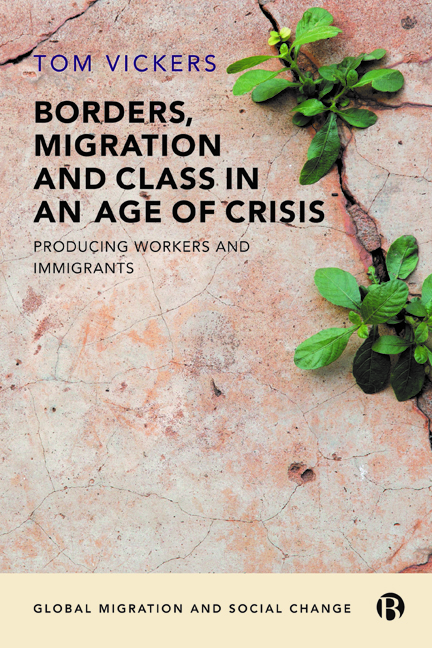Book contents
- Frontmatter
- Dedication
- Global Migration and Social Change
- Contents
- List of Figures and Tables
- Acknowledgements
- Series Preface
- 1 Introduction
- 2 Imperialism, Migration and Class in the 21st Century
- 3 Deconstructing Migrant Crises in Europe
- 4 Deconstructing Welfare Crises
- 5 Mobility Power and Labour Power in the Crisis of Imperialism
- 6 Deconstructing Migrant/Worker Categories in Britain
- 7 Conclusion
- Appendix: Methodology
- References
- Index
1 - Introduction
Published online by Cambridge University Press: 30 April 2022
- Frontmatter
- Dedication
- Global Migration and Social Change
- Contents
- List of Figures and Tables
- Acknowledgements
- Series Preface
- 1 Introduction
- 2 Imperialism, Migration and Class in the 21st Century
- 3 Deconstructing Migrant Crises in Europe
- 4 Deconstructing Welfare Crises
- 5 Mobility Power and Labour Power in the Crisis of Imperialism
- 6 Deconstructing Migrant/Worker Categories in Britain
- 7 Conclusion
- Appendix: Methodology
- References
- Index
Summary
Today, we are immersed in narratives of crisis, from speeches of politicians, to media headlines, to broader public discussion. Campesi (2018: 197) defines crisis as:
a situation that breaks with routine and calls for immediate action. The occurrence of a crisis calls for immediate judgement and decision making, but in circumstances with limited room for manoeuvre.… By labelling a situation as a ‘crisis’ one creates alarm, suggesting the existence of a threat to the ordinary lives of the populace.… The political response … may point to the conservation and consolidation of the legal and political order … or it may open a space for political change.
Indeed, the etymology of crisis is ‘decision’, in the sense of a judgement, from the Greek ‘krisis’. The word first entered the English language as a medical term denoting the turning point in a disease, to be followed by recovery or death. Today's sense of crisis takes forms that are economic, social and political, and are often mutually reinforcing (Castells et al, 2018). Reflecting this, Britain's Conservative Party gained the largest number of votes in the 2010 general election – though not a majority – campaigning on the slogan of ‘Broken Britain’, and won the 2017 general election promising ‘strength’ and ‘stability’. Europe's ‘migrant crisis’ or ‘refugee crisis’ has been presented as the responsibility of those on the move and an existential problem for European societies. Britain's housing system, National Health Service (NHS), social care system and benefits system are also said to be in crisis.
For hooks (2014: 19), the contemporary sense of crisis is located in systems of domination and dehumanisation:
We live in a world in crisis – a world governed by politics of domination, one in which the belief in a notion of superior and inferior, and its concomitant ideology – that the superior should rule over the inferior – effects the lives of all people everywhere.… Systematic dehumanization, worldwide famine, ecological devastation, industrial contamination, and the possibility of nuclear destruction are realities which remind us daily that we are in crisis.
- Type
- Chapter
- Information
- Borders, Migration and Class in an Age of CrisisProducing Workers and Immigrants, pp. 1 - 16Publisher: Bristol University PressPrint publication year: 2019



